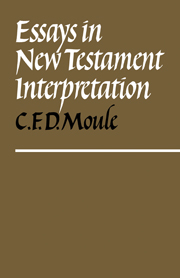Book contents
- Frontmatter
- Contents
- Foreword
- Acknowledgements
- Abbreviations
- Jesus in early Christian interpretation
- Studies in the Gospels
- Two studies in the Epistles
- 8 The problem of the Pastoral Epistles: a reappraisal
- 9 The nature and purpose of I Peter
- Two linguistic studies
- Studies exegetical, doctrinal and ethical
- Index
8 - The problem of the Pastoral Epistles: a reappraisal
Published online by Cambridge University Press: 05 November 2011
- Frontmatter
- Contents
- Foreword
- Acknowledgements
- Abbreviations
- Jesus in early Christian interpretation
- Studies in the Gospels
- Two studies in the Epistles
- 8 The problem of the Pastoral Epistles: a reappraisal
- 9 The nature and purpose of I Peter
- Two linguistic studies
- Studies exegetical, doctrinal and ethical
- Index
Summary
The primary purpose of this lecture is simply to give further definition to the long-standing problem of the Pastoral Epistles. I am inclined to think, though this is a harsh remark, which may recoil, that there is no area of New Testament investigation where theories are proposed with greater inattention to the difficulties attaching to them. It may, therefore, be of some service – however negative – to the cause of scholarship if the difficulties can be clarified. Whether I shall be able also to contribute anything positive towards a solution I doubt (and here, indeed, my strictures are almost bound to recoil), although anyone who underlines a problem is almost under an obligation to make some attempt to find a possible way through it or round it.
It was one of my proudest moments when I received the invitation to give this lecture. Although, early in my university days, T. W. Manson examined me for a university prize and wrote me a characteristically kind note afterwards, in his beautiful hand, it was not until towards the end of his life that I began to know him personally, as a colleague in the making of the New English Bible. But even those few years were enough to kindle in me, in addition to the profound admiration I had already conceived for him as an exact scholar of great erudition, that genuine affection for him as a friend which he won, I think, from all who had the privilege of personal acquaintance with him.
- Type
- Chapter
- Information
- Essays in New Testament Interpretation , pp. 113 - 132Publisher: Cambridge University PressPrint publication year: 1982



